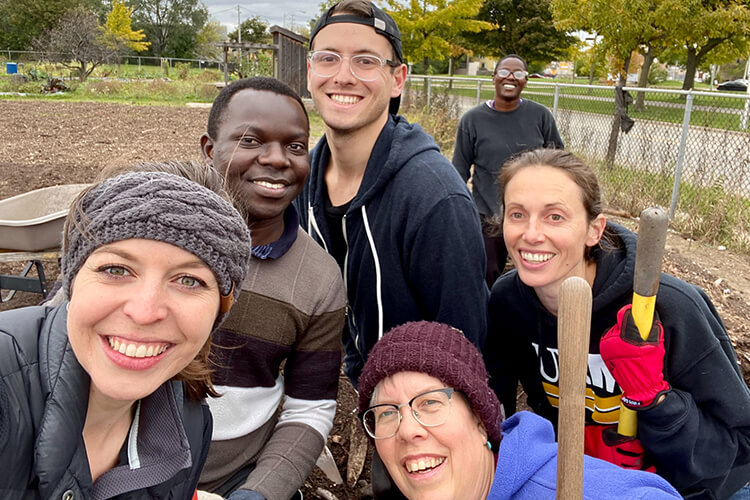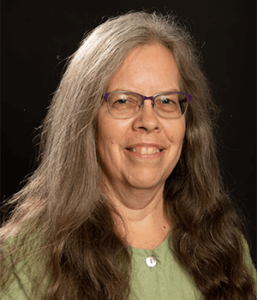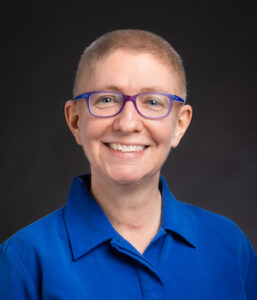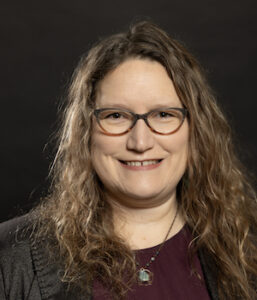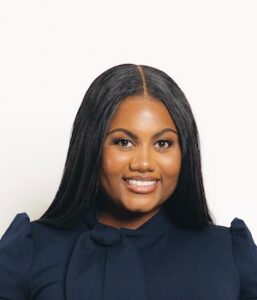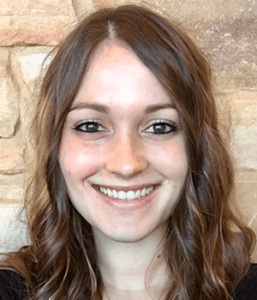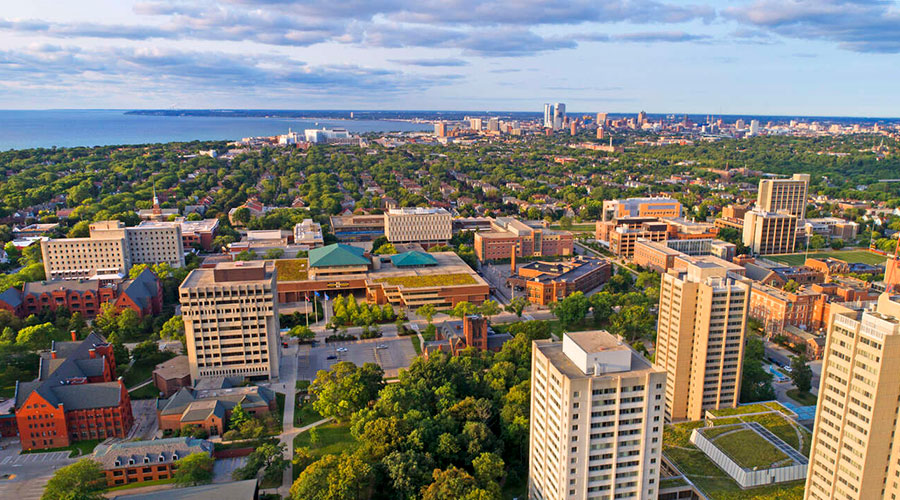Master of Sustainable Peacebuilding (MSP) MSP
The Master of Sustainable Peacebuilding responds to a global and local need for professionals with advanced training in a rapidly growing field.
According to the International Commission on Education for Sustainable Development Practice (2008), there is a gap in graduate programs that train students to think and plan holistically across disciplines and fields. Our program is designed to address that gap harnessing cutting-edge ideas and tools in peacebuilding education.
With generous donations from the J.M. Kohler, Wm. Collins Kohler and Underwood foundations, the MSP was created in 2013. MSP alumni are leaders in the field, bringing a new way of thinking to their work as they navigate pressing global problems, such as climate change, homelessness, food security and health disparities. Graduates of the MSP are well-versed in systems thinking, tools for structural change and the importance of embracing complexity.
Program Type
Master’s
Program Format
On Campus
MSP Learning Philosophy
The MSP uses classroom- and community-based learning to teach critical leadership skills in systems thinking, conflict analysis, facilitation, strategic planning and evaluation. The program is rooted in practice – students learn through hands-on, collaborative class projects and a fieldwork practicum.
The MSP embraces a cohort-based, trans-disciplinary model, and students are drawn from diverse academic, socio-cultural and professional backgrounds. Dialogue and relationship-building among students is central to the MSP learning philosophy.
The Master of Sustainable Peacebuilding prepares its students for careers engaging in today’s complex global problems. The curriculum incorporates a holistic approach that integrates diverse academic fields and professional sectors. The MSP requires 40 credits, with both full-time (two years) and part-time (three years) options. The core coursework centers on:
- Community resilience
- Systems thinking
- Conflict transformation
Courses are a blend of theory and practice. Throughout the program, students will have many opportunities to work directly with community organizations through class projects and summer fieldwork.
Scholarships & Funding
We understand that financial support is important to every student. A variety of options are available to help students finance their education at UWM, including over $500,000 in nursing scholarships & funding awarded annually, as well as loans, grants, student employment, fellowships, military education benefits and more.
MSP graduates pursue careers in a variety of sectors, providing a holistic or complex lens to projects and programs. MSP alumni are currently working in the private, public and nonprofit sectors, with a small subset pursuing doctoral degrees.
Where are they now? Check out a few of our alumni.
Sam Dorios, 2016
Systems and Complexity Associate, Hawaii Leadership Forum (Honolulu, Hawaii)
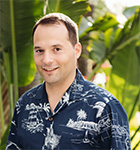
Hawaii Leadership Forum (HLF) is a societal change organization dedicated to fostering enduring, positive change in Hawaii. The main track for accomplishing this is a cross-sectoral leadership program, the Omidyar Fellows, which cultivates a community of midcareer leaders to equip them with the skills and relationships they will need to collectively transform Hawaii. Sam’s job is to support the fellows in their efforts. This usually takes the form of systems mapping; a process that he facilitates. Currently, his role is expanding to incorporate emergent learning so that the organization can continually adapt and improve its ability to create impact.
“The MSP program gave me the tools and skills needed to do systems mapping, but more importantly, it taught me the mindsets needed for this line of work. The nature of grappling with complexity requires an open mind, desire to constantly learn and improve, and a willingness to adapt. This inner work must be done before any meaningful outer work is possible. Moreover, the MSP connected me to HLF through an internship opportunity that led directly to my current position.”
Aruna Kallon, 2018
PhD Candidate in Educational Policy Studies, University of Wisconsin-Madison (Madison, Wisconsin)
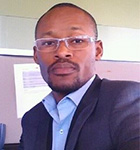
Aruna is a PhD student in Educational Policy Studies, with a concentration in Comparative International Education (CIE) at the University of Wisconsin-Madison. Aruna’s research focuses on the effects of free primary and secondary schooling on educational quality and outcomes in Sierra Leone. Aruna intends for his research to provide an understanding of, and inform, local and foreign/external interventions for a sustainable implementation of the fee-free policy, and for narrowing the achievement gaps for approximately 1.5 million schoolgoing children in Sierra Leone.
“MSP nurtured in me a unique ethos: to embrace complexity as an opportunity or entry point for action and change, rather than as a limitation.”
Linda Xiong, 2019
Systems Change Coordinator, Texas Homeless Network (Austin, Texas)
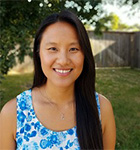
Linda works with agencies across the Texas Balance of State Continuum of Care to establish and operate Coordinated Entry. Coordinated Entry is a community-led process and systems change approach that shifts a housing crisis response system from program-centric to person-centric.
“Through the MSP program, I discovered the breadth and depth of systems thinking as it relates to complex social problems and became confident as a facilitator of systems change. My cohort exemplified a community of peacebuilders where we shared and valued diverse perspectives and built strong friendships – a community I hope to develop wherever I go.”
Students in the Master of Sustainable Peacebuilding program pair coursework with fieldwork to participate in learning experiences that allow them to use their skills learned in class.
Fieldwork
Fieldwork is the “heart” of the MSP. It is through fieldwork that students try out the methods and skills learned in class. Fieldwork also connects students directly to leaders in their fields of interest, allowing them to begin cultivating a professional network. Students partner with an organization of their choosing and collaboratively develop a fieldwork project. There is a large degree of flexibility regarding the geographic location, organization type and topical focus of a student’s fieldwork. Students interested in going abroad may need to be fluent in the local language.
- ACCMARI (community development org) Ixil Triangle, Guatemala
- Agape Scholars International Malawi
- Alliance for the Great Lakes Milwaukee
- ADIFORT (community development org) La Fortuna, Costa Rica
- Arts@Large Milwaukee
- Best Baby Zones Milwaukee
- City of Milwaukee Milwaukee
- Community Health Internship Program multiple sites in Wisconsin
- Danube Delta Biosphere Reserve Romania
- Engineers w/o Borders Germany/Sri Lanka
- Environmental Protection Agency Duluth, MN
- Eurasia International University Yerevan, Armenia
- Fourth “R”/Dr. Heidi Luft Dominican Republic
- Grandmothers Beyond Borders Uganda
- Great Lakes Inter-Tribal Council Wisconsin
- Groundwork Milwaukee Milwaukee
- Haggerty Museum, Marquette University Milwaukee
- Hawaii Leadership Forum Honolulu, HI
- Housing Authority of the City of Milwaukee Milwaukee
- IKIAM University Tena, Ecuador
- Impact Milwaukee
- Institute of Public Health Macedonia
- Institute for Urban Health Partnerships Milwaukee
- Institute of Public Health Macedonia
- Institute of World Affairs, UWM Milwaukee
- Interfaith Conference of Greater Milwaukee Milwaukee
- International Peace Initiatives Meru, Kenya
- Kars Urban and Culture Research Association Kars, Turkey
- Kiva Wisconsin Milwaukee
- Local Initiatives Support Corporation Milwaukee
- Mali Watch International DC/Mali
- McNair TRIO at UWM Milwaukee
- Milwaukee 7 Milwaukee
- Milwaukee Health Department Milwaukee
- Milwaukee Water Commons Milwaukee
- Municipality of Ruminahui Quito, Ecuador
- Muslim Community Health Center Milwaukee
- National Parks Service Friday Harbor, WA
- Nepal Policy Center Lalitpur, Nepal
- Ock Pop Tok Laos
- PACA 40 Warsaw, Poland
- Racism and Health Collaborative Research Team Milwaukee
- RiverEdge Nature Center Saukville, WI
- Riverwest Food Pantry Milwaukee
- Silver Spring Nursing Center (IUHP) Milwaukee
- Silver Spring Wellness Initiative Milwaukee
- Stonehouse Water Technologies Kewanee, WI
- Student Success Center, UWM Milwaukee
- The Nature Conservancy Wisconsin Lake Beulah, WI
- The Omidyar Group San Francisco, CA
- The Women’s Bakery Kigali, Rwanda
- Ulupono Hawaii
- Wi’iam Palestinian Conflict Resolution Center Palestine
- YWCA Green Bay, WI
Coursework
Fall Year 1 (9 credits)
| Course Name | Course Number | Credits |
|---|---|---|
| The Politics and Policy of Sustainability | MSP 760 | 3 |
| Preparing for Sustainable Peacebuilding and Social Change | MSP 770 | 3 |
| Transdisciplinary Research Methods and Information Literacy | MSP 780 | 3 |
Spring Year 1 (11 credits)
| Course Name | Course Number | Credits |
|---|---|---|
| Complex Human-Environmental Interactions | MSP 761 | 3 |
| Holistic Peacebuilding Practice | MSP 771 | 3 |
| Innovation, Evaluation and Adaptive Management | MSP 781 | 3 |
| Fundamentals of Project Management | MSP 785 | 2 |
Summer Year 1 (2 credits)
| Course Name | Course Number | Credits | |
|---|---|---|---|
| Fieldwork in Sustainable Peacebuilding | MSP 797 / 798 | 2 |
Fall Year 2 (9 credits)
| Course Name | Course Number | Credits |
|---|---|---|
| Leadership and Program Management | MSP 791 | 3 |
| Elective* | 3 | |
| Elective* | 3 |
Spring Year 2 (9 credits)
| Course Name | Course Number | Credits |
|---|---|---|
| Negotiation and Group Problem Solving Skills | MSP 790 | 3 |
| Reflective Practice | MSP 786 | 3 |
| Elective* | 3 |
Students Prior to Fall 2021
MSP students who started prior to Fall 2021, please refer to the handbook or advisor for curriculum.
MSP Program Director
Faculty and Staff
- Teaching Faculty, Master of Sustainable Peacebuilding
Advisory Board
In addition to core program faculty and staff, MSP has a multidisciplinary and cross-campus collaborative advisory committee.
- Alexa Anderson, Assistant Professor, Nursing
- Anne Dressel, Assistant Professor, Nursing
- Timothy Ehlinger, Emeritus Associate Professor, Sustainable Peacebuilding
- Kirk Harris, Assistant Professor, Urban Planning
- Jeana Holt, Assistant Professor, Nursing
- Marissa Jablonski, Director, Freshwater Collaborative of Wisconsin
- Theodore Lentz, Assistant Professor, Criminal Justice & Criminology
- Joanne Lipo Zovic, Faculty Associate, Sustainable Peacebuilding
- Paula Lucey, Clinical Assistant Professor, Nursing
- Mary Elise Papke, Assistant Dean/Lecturer, Public Health
- Marie Sandy, Associate Professor, Administrative Leadership
- Aaron Schutz, Professor & Department Chair, Educational Policy and Community Studies
- Caroline Seymour-Jorne, Professor, French, Italian, and Comparative Literature
- Dimitri Topitzes, Professor, Social Work
- Linda Wesp, Assistant Professor, Nursing
- Lynne Woehrle, Director & Associate Professor, Sustainable Peacebuilding
- Christine Wolf, Assistant Director, Global & International Studies
Students
Sabaa Abdulrazzaq
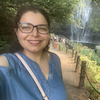
My name is Sabaa (Saba’a) from Baghdad- Iraq. I have been in Wisconsin since 2014; I came from an immigrant family looking for peace and a stable life. I got my undergrad from UW-Milwaukee with a BS in Biochemistry and Clinical Pharmacology. I worked as a teacher assistant for 4K at the YMCA for three months. Worked as Leader for kids after school at Boys and Girls Club for the school year. I worked as a Research Specialist at UW-Oshkosh in Biology- Parasite with Dr. Shelly.
Choosing this master’s program in Sustainable Peacebuilding MSP would engage my experience of community people with Health and Education.
Cynthia Chirinda

Cynthia is a Human Capital Development, Strategy and Communications practitioner who has worked with various corporates, international development agencies, government ministries, coalitions, political organizations, faith-based organizations, and commissions in areas of leadership development, youth, and women empowerment. She is a holder of a BBA in Marketing Communications from IMM, South Africa.
She joined the MSP program because of its transformative learning approach that engages complex global challenges and enhances capacities for ethical community engagement on an international scale. As an Institute for Systems Change and Peacebuilding Fellow, Cynthia is eager to apply Systems Thinking and Peacebuilding skills to promote wholeness in communities. Her goal is to become a systems change and social dialogue expert who facilitates social change and transformation in families, communities and nations.
As a life coach, speaker and published author, Cynthia’s messages promote disruptive thinking by provoking people and institutions to challenge their comfort zones, live integrated lives and create trans-generational solutions through paradigm shifts and transformative actions.
Marissa Cudworth
Marissa is pursuing the Master of Sustainable Peacebuilding program at the University of Wisconsin—Milwaukee, where she hopes to learn skills for advocacy and equity building for Latinx farmers. Marissa is a two-time Public Allies Wisconsin alum; she spent her service years engaging communities of color in environmental work in Milwaukee. Her dream is to continue to uplift women, queer folks, and POC in the environmental field in order to build community resilience. Marissa is an advocate for healing justice and encourages folks to rest and heal through authentic self expression, creative pursuits, and a connection to land and water.
Jerica Fehr

Jerica Fehr holds a Bachelor of Science in Community Engagement and Education from the University of Wisconsin Milwaukee. Her professional journey revolves around her research interests in community resiliency and nature programs. As a Community Engagement Specialist at the Urban Ecology Center, Jerica combines her academic background with her passion for health, wellness, nature, and peace, actively contributing to the well-being of communities.
Beyond her professional pursuits, Jerica expresses her creativity through painting and poetry, delights in culinary adventures in the kitchen, and finds solace in the serene embrace of nature while playing in the woods. Jerica’s dedication and diverse interests make her a remarkable advocate for building resilient communities and fostering a deep connection with the environment.
Silvia Patricia Gelvez Delgado

Silvia is from Colombia. She graduated from Universidad de San Buenaventura-Bogotá with a bachelor’s degree in International Relations. She has been involved with the Colombian Red Cross for thirteen years in a variety of programs related to peace building, community development, risk management and youth leadership. Her passion for peacebuilding includes educating ex-combatants from the former FARC guerrilla group in nonviolent communication, and mediation in a reconciliation process across Colombia. She later worked for the Program of Peace and Human Rights of the Swiss Embassy in Colombia where she gained experience in international efforts to promote a participatory and a holist approach of dealing with the past and conflict. Silvia is currently the vice-chair of the Youth Commission of the International Federation of Red Cross and Red Crescent societies, where she leads the Global Project of the Youth Engagement Strategy.
Amy Horst
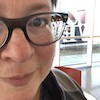
Amy Horst (she/they) is an arts worker, parent, educator, and community member. A naturalized cheesehead from the South, Amy has spent three decades and counting in costume design and production support. She also spends time with children at Milwaukee German Immersion School, Milwaukee Childcare Collective, and First Unitarian Society of Milwaukee. They hope to gain skills to deepen their practice of welcome in both professional and volunteer contexts, and to support the creation of a just world with a minimum of harm done. She lives in Milwaukee with her spouse and teenager. Their hobbies include: sleeping, giving hugs, reading, swimming, and finding delight.
Derek Johnson
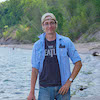
Derek Johnson is a graduate student in the University of Wisconsin-Milwaukee’s Sustainable Peacebuilding program. Derek is a former photojournalist who covered the Waukesha Christmas Parade tragedy and many of the Black Lives Matter protests, as well as other breaking news events, who earned his undergraduate degree in Journalism, Advertising and Media Studies from UW-Milwaukee in 2022. He has also worked as AmeriCorps VISTA at the Community Outreach Health Clinic in Menomonee Falls, Wisconsin, a Research Fellow and a groundskeeper. He is passionate about the importance of the press, public health, and violence prevention, and is a skilled writer and photographer with an aptitude for European languages and contending high with stress environments. When Derek isn’t at school or his job, he can be found hiking in the remote areas of the of the United States while attempting to perfect the art of astrophotography.
Elizabeth Malanaphy
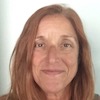
As an educator, citizen scientist and activist, Liz has enrolled in the MSP program to up her game in helping create meaningful, sustainable change in our world. A stay-at-home mother of five, with ten years as an educator in the public schools, and 30 years creating collaborative programming for young people and communities, she is more concerned than ever about the state of our world. ” There are so many pressing, volatile issues, and oppressive systems in this world, and the MSP program has the perfect, interdisciplinary approach to finding sustainable solutions. These are ideals which will be in high demand in the coming decade(s)!” The MSP program has given Liz more hope than she has had in a long time, and Liz looks forward to the interdisciplinary, collaborative, layered approach of this track, as well as working with the incredible people at UW-Milwaukee!
Denise Manjarrez-Renteria

My name is Denise Manjarrez-Renteria (she/her/ella are my pronouns). I grew up in the southside of Milwaukee, more specifically the Muskego Way neighborhood. I went to Alverno College for undergrad and graduated with a BA in Global Studies and International Affairs with a minor in Political Science. Since then, I’ve worked in community and civic engagement.
I am passionate over many social justice issues, but currently, I want to expand my knowledge and experience within geopolitical issues. You can currently find me at Urban Ecology Center as their Neighborhood Engagement Specialist where I am actively working in the community, focusing on restorative justice, and trying to make a change within.
Daniel Monge

I earned BS degrees from UWM in Physics and Mathematics, and my MS in Physics from Indiana University, and would like to become a Medical Physicist. In addition to trying to understand the universe, I have the desire to give back to the world, to be a leader, and to help further the sustainability of life. I would like to start a physics summer academy for Native American/Indigenous/”Latino” children and create a Youtube science page for people of color. I want to inspire young people from my community to develop their inquisitiveness, to not be ashamed of being smart, to be proud of who they are, and to know that they can be anything they want to be. I would also like to become involved in medical physics to help save lives and, possibly, develop new technology. Further, I would like to, eventually, influence large-scale policy, whether via a governmental agency, in a hospital setting, or some Montessori organization.
Mala Nan Leth
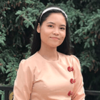
Mala Nan Leth is a first generation University student, and an underrepresented racial/ethnic minority. She was born in Bangkok, Thailand, growing up on the Thai/Myanmar border in a refugee camp, Ban Dom Yan (BDY). Her family resettled in Milwaukee in 2014 as refugee newcomers. She lives with a single mother who works part time to support her and her other three younger siblings.
Due to a shortage of staff in the refugee school, Mala was a teacher of first grade children in BDY Camp when she was just 14 years old. She interned at the International Institute of Wisconsin for two semesters: Spring 2021 and Summer 2021; she worked in the Refugee Resettlement Program for newcomers, and also worked part time at IIW helping with case notes management and Bureau of Population, Refugee and Migration (PRM) Case reviews in the Spring and Summer of 2022. Mala also has tutored at South East Asian Literacy (SEAL) from 2018 to the present. This is a place where refugee children get help with homework and learn about American culture.
Mala decided to further her education upon learning about the Master of Sustainable Peacebuilding (MSP) Program through Catholic Charities. She has first hand knowledge of the violence in Myanmar/Burma, as it is her families’ land. She would like to be able to work with the United Nations helping refugees and immigrants outside of the United States. Her goal is to learn how to prevent violence, bring peace, while hoping to give a new life and home to those who belong nowhere.
Mala achieved her bachelor’s degree in Social Work with honors from UWM, served on the US Committee for Refugees & Immigrants, and is a member of the Rohingya American Society. She joins the MSP as an Advanced Opportunity Program Fellow.
Yolanda Odufuwa

Yolanda Odufuwa (They/She) graduated from Beloit College with a BA in Political Science and Critical Identity Studies. Their time as a Mcnair Scholar, volunteer for Black abolitionist organizations and heavy involvement in organizations like BSU and Students for an Inclusive Campus cemented their research interest in race and U.S. politics, political behavior, social justice movements, and resistance to state violence. Yolanda joins the MSP as a fellow with the MKE Black Grassroots Network for Health Equity to continue their passions of applying Black queer feminist values to public policy initiatives and learning strategies to combat racial injustice.
Julien A Phifer

1st Gen College graduate of UW-Milwaukee B.A in Psychology. Julien has explored more than a few majors during his time as an Undergrad. He credits those years as a path to understand exactly who he is and how he wants to give back to the world. Julien’s mission is to Link Up Greatness wherever his path leads him. He believes the world makes simple things complex and it’s for us to take a step back, with a deeper and collective look to make these complex issues clear. Julien advocates for holistic and mindful living, and contains a fiery passion to help the youth, their families and the overall community of Milwaukee while he’s here.
Bryan Rogers
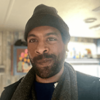
Bryan Rogers, former Witness for Peace Honduras Program Coordinator, has facilitated dozens of delegations across Latin American and the Caribbean, including two to Cuba. His work as an educator, organizer, writer and musician has taken him into the heart of a grassroots student movement in Chile; black liberation struggles in Salvador, Brazil; land reclamation and reparations projects led by black indigenous Garifuna in Honduras; anti-drug war and anti-militarization caravans through Central America; and managing a sheriff’s campaign for a queer black feminist running on an anti-racist platform. He holds bachelors in Spanish/Portuguese and Latin American Studies from UW-Milwaukee and studied jazz piano at Columbia College. He currently lives in the River West neighborhood with one lovely spouse, two lively children, and three mostly obedient house animals.
Zarifa Saadat
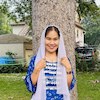
Zarifa Saadat’s journey as the first person in her family to study abroad and her status as a racial/ethnic minority may come with unique challenges and opportunities. She may have faced various cultural, linguistic, and academic adjustments during her time abroad. Still, her determination and resilience likely helped her overcome these challenges and succeed in her educational pursuits. Her academic journey began at the Asian University for Women, where she completed her undergraduate degree. There, she majored in economics and took development studies as her minor. This educational background has laid a solid foundation for her current pursuit in Sustainable Peacebuilding, as it enables her to approach the subject with a multidisciplinary perspective. She chose MSP because this program will enable her to pursue a career in peacebuilding, which is exciting to her.
Zarifa’s goal is to become a member of the United Nations and a leader in the field of peacebuilding. She aspires to work closely with communities and organizations worldwide, dedicating her efforts to the development of sustainable and inclusive peacebuilding initiatives. While her overarching mission is to contribute to global peace and stability, her primary focus lies in extending a helping hand to immigrants and refugees who have faced the challenges of displacement and resettlement. Moreover, she is deeply committed to advocating for underprivileged women and children, recognizing their vulnerabilities and the critical need for empowerment and support. By pursuing this path, she hopes to foster a world where every individual, regardless of their background, can thrive in an environment of peace, dignity, and opportunity.
Okeowo Segun Daniel

Okeowo Segun Daniel is a dedicated social impact entrepreneur, project manager, community manager, education and training consultant, and peace advocate who has made significant contributions in the non-profit sector. He holds a BSc in Educational Technology from the University of Ilorin and has worked tirelessly to provide quality education, sustainable development, Peace and Resilience building training, and advocacy for children, educators, youths, and communities.
Previously, he served as a Training and Program Director for One African Child Foundation and Founding Impact Officer for World Economic Forum, Global Shapers Community, Ilorin Hub. He also held the Director of Partnership for the hub, focusing on building a supportive network for youths worldwide and providing them with the right resources to create sustainable impacts in their communities.
Daniel’s expertise in training educators in West Africa on peace and resilience building and preventing violent extremism has earned him recognition from various organizations, including UNESCO INTERNATIONAL INSTITUTE FOR CAPACITY BUILDING IN AFRICA (UNESCO IICBA), NATCOM UNESCO, UNODC, and Global Shapers Community.
Okeowo Segun Daniel is a visionary leader with a passion for social change and empowering the next generation to create a better world. He currently Founded World Youth Hub to support youths around the world with right resources they need and promote their work. He’s also Currently pursuing his Masters in Sustainable Peacebuilding at University of Wisconsin, Milwaukee.
Jessie Thompson

Jessie Graduated from Arizona State University in 2021 with a BA in Sustainability and a minor in Urban Planning. In her time as a sustainability student, Jessie studied the intersection of environmentalism and social justice. Jessie has an extensive background in local, sustainable agriculture, and has worked with both Groundwork Milwaukee and the Eco-Justice Center on farms growing produce and caring for farm animals. She has also learned the basics of large-scale hydroponic farming through volunteering at Hundred Acre in Milwaukee. Outside of MSP, Jessie works as a farm worker for Full Circle Healing. She enjoys farming and seeks to understand how urban agriculture can be utilized to foster community building connections.
Ifeoluwapo Tolorunju
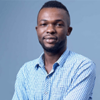
Ifeoluwapo Tolorunju earned a bachelor’s degree in Religious Studies and Philosophy from Adekunle Ajasin University, Akungba-Akoko, Ondo State.
His interest in the Masters of Sustainable Peacebuilding (MSP) was stirred by his personal experience of political violence and his experience living and working in the fragile region in Nigeria. He has devoted several years working in development and peacebuilding through several local non-profit organizations in Nigeria.
His research interest revolves around youth involvement in violent conflict, peace processes and human security. As a master’s student, he plans to build upon his experience and explore how youth involvement in peace processes can strengthen community development and social justice.
Before joining the MSP program, he worked as the Operations Assistant for Some Good Foundation, where he supported several educational-focused projects in Lagos State, Nigeria.
Ifeoluwapo is an Institute for Systems Change and Peacebuilding Fellow.
Tomi Vandergriff
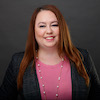
Tomi is a UWM alum, who graduated in 2013 with a BA in Religious Studies. She studied abroad in Morrocco with the School of Public Health for a summer program in 2013 with a focus on women and infant health in Islamic societies and realized she eventually wanted to work in an international setting. After returning to the States, she began an internship at the International Institute of Wisconsin and was quickly hired. She worked there for six years in refugee resettlement as the medical liaison and the intensive case manager for high needs clients. For the past three years Tomi has been working at Great Lakes Hemophilia Foundation as their Director of Special Events and Donor Engagement.
Tomi is active in the community, volunteering her time with the Irish Cultural Heritage Center as their bar manager and volunteering throughout the year with Celtic MKE, Stars and Stripes Honor Flight and Holiday Folk Fair International. In her free time she loves to travel and spend time with her family and friends.
If you are motivated to understand the complex dynamics underlying the issues facing today’s world and dream about being an effective changemaker, we encourage you to learn more about the MSP!
The MSP is a cohort-based program that begins each year in September only. Applications are accepted until all spots for the cohort have been filled, or by June 1 at the latest.
Dates and Deadlines
- December 15: Applications completed by this date will be considered in the initial review and receive priority consideration for funding opportunities available through MSP.
- February 1: Applications completed by this date will be considered in the second round of reviews. International applications must be completed by this date to be considered for admission the following fall.
- February 2 – June 1: Rolling admissions for any remaining program spots. Applications completed after June 1 will be automatically rolled into the application pool for the following year.
- April 1: Acceptance deadline for funded positions and international students.
Prerequisites
Applicants must hold a bachelor’s degree from an accredited program with a minimum GPA of 2.75 (4.0 scale) to be considered for admission.
Application Process
To be considered for admission, all applicants must complete an online application, including:
- Pay the nonrefundable application fee;
- Upload unofficial transcripts from all schools attended, regardless of how long ago it may have been. Applicants will be required to submit official transcripts after an admission offer is accepted;
- Upload a current professional resume or CV;
- Upload a 2-3 page Personal Statement (Reason for Graduate Study). This essay should address any or all of the following:
- What brought you to MSP?
- Why is MSP a good fit for you?
- How will MSP help you advance your professional goals?
- Share a personal story that relates to why you want to join MSP.
- Which faculty member(s), community organizations, and/or global issues are you interested in working on while in MSP?
- Submit the names and email addresses of at least two references who will write a letter of recommendation for you. If possible, include one academic (e.g. advisor) and one professional (e.g. supervisor) reference. At least two letters must be received by UWM for your application to be considered complete.
- Upload a writing sample (max 10 pages) from within the past five years. The type of sample you submit is up to you. Examples include:
- Paper from a college course;
- Excerpt from an undergraduate thesis;
- Grant proposal
- Peer-reviewed article;
- a Web-based piece, such as a blog entry or news article;
- Project report or evaluation;
- Guided Research Essay (this is suggested if you do not have a writing sample you would like to submit).
- Upload evidence of English proficiency (international students only). The language of instruction at UWM is English. All international applicants must provide evidence of proficiency. View details at the UWM Center for International Education’s website. Email questions to isss@uwm.edu.

